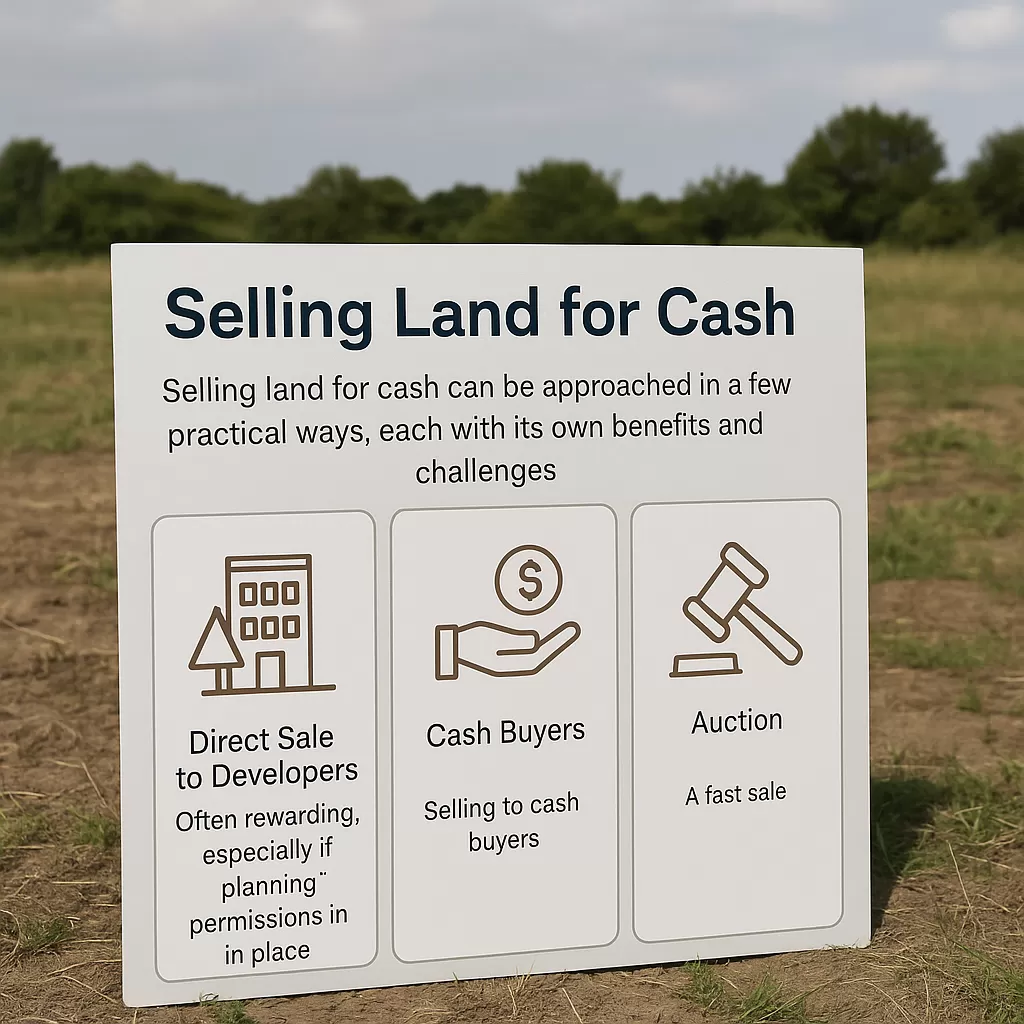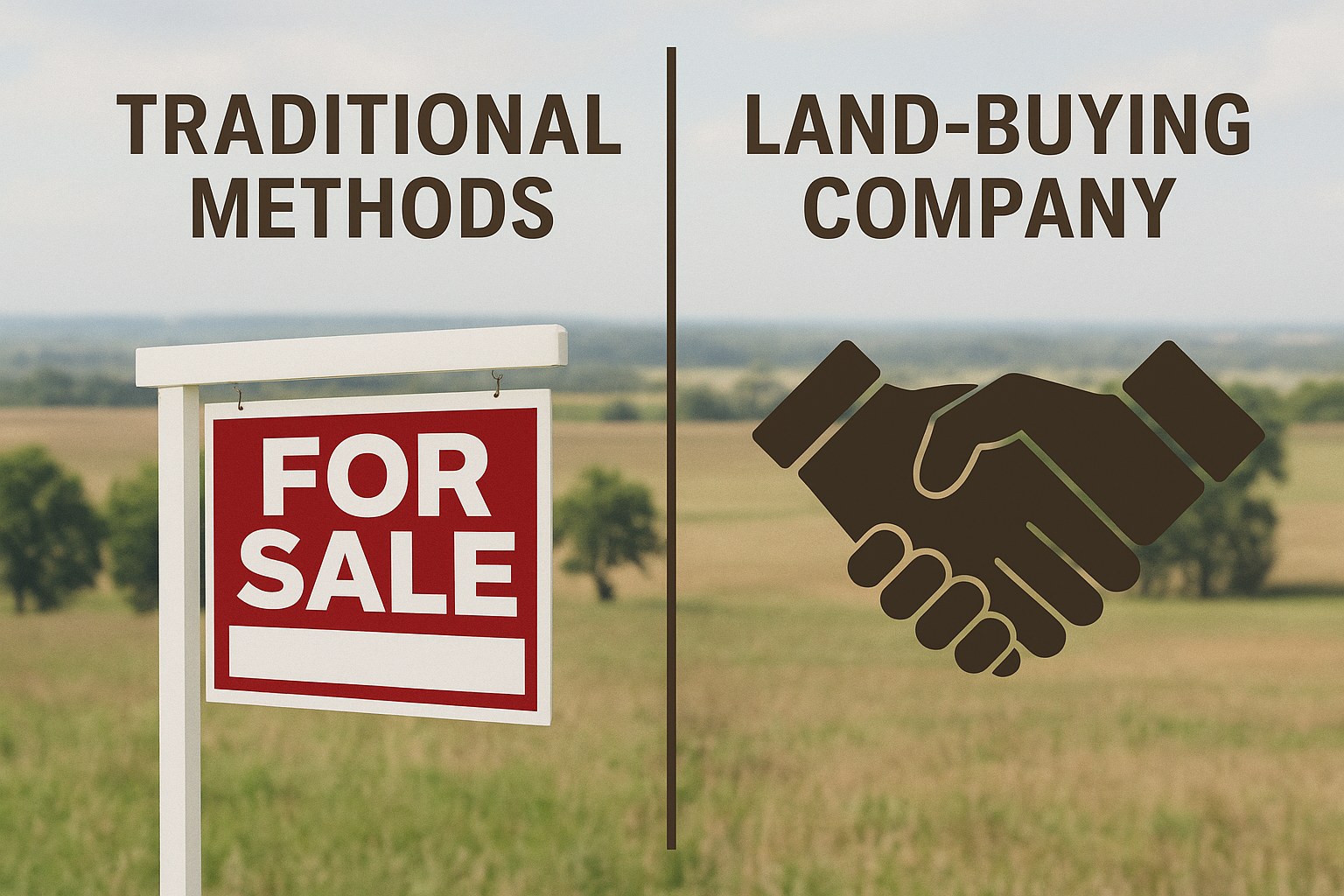Selling land can feel daunting, especially if you hope to convert it into cash quickly. Whether dealing with an inherited plot, surplus agricultural land, or a development site you no longer wish to pursue, understanding the top ways to sell land quickly for cash is crucial. In this in-depth guide, we’ll explore the most effective, proven strategies to sell your land fast while still securing the best possible value — all explained clearly, with no jargon.
Why Selling Land for Cash Can Be a Smart Move
Converting land into cash provides immediate liquidity, allowing you to reinvest, pay off debts, or free up capital for other projects. Unlike residential properties, selling land comes with unique challenges: buyers can be more selective, financing is less common, and the market can be unpredictable. However, choosing the right strategy and preparing thoroughly can overcome these obstacles and achieve a quick, hassle-free sale.
1. Direct Sale to Developers: Unlocking Maximum Value
Why Developers Offer Higher Returns
One of the most lucrative ways to sell land quickly for cash is selling directly to property developers. Developers are always looking for prime plots that can be turned into residential, commercial, or mixed-use projects. They often pay premium prices, particularly if your land has planning permission or clear development potential.
Boosting Your Land’s Appeal
If your land already has planning consent, its market value can increase dramatically. Without permission, developers may enter into conditional agreements (where they buy only if they secure planning) or option agreements (giving them the right to purchase later after approval). In some cases, you can even explore joint ventures where profits are shared — though these require robust legal agreements and careful negotiation.
Professional Guidance is Essential
Engaging a specialist land agent or an experienced solicitor is crucial here. They can identify reputable developers, handle negotiations, and ensure legal compliance. You’ll also need detailed market analysis to understand local demand, zoning rules, access to utilities, and infrastructure plans.
Timeline and Considerations
While selling to developers can yield high returns, it usually takes longer — often six months to a year — because of planning and legal complexities. This route can be advantageous if your priority is maximizing price rather than immediate cash.
 Effective methods to sell land fast
Effective methods to sell land fast
2. Sell to Cash Buyers for a Fast, Hassle-Free Deal
The Appeal of Cash Buyers
If speed is your top preference, selling to cash buyers is among the top ways to sell land quickly for cash. Cash buyers—who include private investors, specialist land buying companies, and investment groups—focus on fast, unconditional purchases without relying on mortgages or planning outcomes. These sales can often be completed in under 30 days.
Preparing for a Smooth Sale
To attract serious cash buyers and ensure a seamless transaction, prepare the following documentation upfront:
- Up-to-date title deeds
- Accurate boundary plans
- Any planning history
- Environmental surveys, if available
High-quality photos, drone shots, and clear, engaging descriptions can significantly improve buyer confidence and speed up the process.
Verification and Safety
Always verify a buyer’s credentials before proceeding. Ask for proof of funds and references and check their track record. Using a solicitor to handle contracts and oversee fund transfers protects you against potential fraud or disputes.
Trade-off: Speed vs Price
While cash buyers offer speed and certainty, they may offer slightly lower prices than developers. However, if a fast exit and immediate liquidity are most important, this remains a top choice.
3. Sell at Auction: Fast, Transparent, and Competitive
Why Auctions Work
Land auctions provide a transparent, time-bound method for achieving a quick sale. Once the hammer falls, contracts are typically exchanged immediately, with completion often following within 28 days. This route is popular with investors and developers looking for opportunities without drawn-out negotiations.
Types of Land Best Suited to Auctions
Auctions work particularly well for unusual plots, surplus land, or land without planning consent where the value is uncertain. The competitive nature of auctions can drive up prices if multiple bidders are interested.
Preparation Steps
To maximize success at auction:
- Set a realistic reserve price based on a professional valuation.
- Compile a thorough legal pack, including title documents, searches, and planning records.
- Use a reputable auction house experienced in land sales.
- Promote widely through online platforms, local marketing, and targeted outreach.
Risks and Costs
While auctions offer speed, there’s always a risk of lower-than-expected prices if interest is weak. Additionally, auction fees and marketing costs can reduce net proceeds. Legal advice is essential to ensure contracts are clear and your interests are protected.
Understanding Land Value: Key Factors to Consider
Knowing your land’s value helps you price realistically and negotiate confidently. Several factors influence land value:
- Location and Accessibility: Proximity to towns, transport links, schools, and amenities boost value.
- Development Potential: Land with planning permission (full or outline) usually commands a premium.
- Size and Shape: Larger, regular-shaped plots are often more attractive to developers.
- Topography and Access: Flat, easily accessible plots with good road frontage are more marketable.
- Availability of Services: Access to utilities like water, electricity, and sewage improves appeal.
- Environmental and Legal Constraints: Flood risk, contamination, restrictive covenants, or rights of way can reduce value.
- Market Conditions: The wider economic climate, interest rates, and local demand play significant roles.
 Best methods to sell land
Best methods to sell land
Preparing Your Land for Sale: Steps to Ensure Success
Legal and Financial Readiness
Start by ensuring that title deeds are correct and up to date. Resolve any boundary issues, easements, or rights of way before marketing. If there’s a mortgage or charge on the land, notify your lender early.
Full disclosure about planning restrictions or environmental issues is critical to avoid future disputes. Working with an experienced solicitor helps prepare legally sound agreements and protect your interests.
Tax Considerations
Selling land can trigger tax liabilities such as Capital Gains Tax or, in some cases, VAT and Stamp Duty Land Tax. Consulting a tax advisor before listing can help you understand your obligations and avoid unpredictable costs.
Effective Presentation and Marketing
Professional photography — including aerial drone images — can showcase the land’s potential far better than standard shots. Clear, engaging listings should highlight key features, planning status, access, and local amenities.
Maximise exposure by listing on UK land sale portals, collaborating with estate agents, leveraging social media, and tapping into regional networks. The more targeted your marketing, the more likely you are to reach serious buyers quickly.
Choosing the Right Sales Strategy for Your Needs
Tailoring to Buyer Types
Understanding your potential buyers helps you focus your strategy. Developers seek plots with clear planning prospects, while cash buyers prioritize quick, simple transactions. Private individuals or self-builders might value privacy, scenic views, or recreational potential.
Considering Alternative Agreements
If an outright sale isn’t immediately possible, consider:
- Option Agreements: Give a buyer the right to purchase after securing planning permission.
- Conditional Contracts: The sale is completed only after certain conditions (e.g., planning approval) are met.
- Joint Ventures: Partnering with developers to share future profits.
These structures can sometimes lead to higher eventual returns but may involve longer timelines and more complexity.
 How to sell land quickly and easily
How to sell land quickly and easily
Protecting Yourself During Negotiations
Negotiating a land sale can be complex. Stay clear about your bottom line and avoid accepting offers that significantly undervalue your property. Always involve your solicitor during negotiations to maintain a professional approach and ensure all terms are fair and transparent.
Flexibility around payment terms or completion dates helps close deals more quickly. However, clear, written agreements are crucial to avoid misunderstandings or legal issues later.
The Role of Professional Advisors
Why You Need Expert Help
Engaging professionals — such as land agents, solicitors, surveyors, and tax advisors — is an investment in a smooth, profitable sale. They provide market insights, legal protection, and negotiation support that can prevent costly mistakes and help you achieve the best possible outcome.
Building Buyer Confidence
Buyers are more confident when they see thorough, professional preparation. Accurate documentation, explicit marketing materials, and expert representation build trust and encourage faster, higher-quality offers.
Final Thoughts
Successfully navigating the top ways to sell land quickly for cash involves balancing speed, price, and simplicity. Understanding your land’s value, preparing detailed documentation, choosing the right buyer type, and working with trusted professionals can help you secure a fast sale without sacrificing your returns.
Whether you opt for a direct developer sale, a quick cash buyer transaction, or an auction, thorough preparation and strategic marketing are key. Remember: presenting your land professionally speeds up the process, builds buyer confidence, and improves final sale outcomes.
At The Property Buyers, we specialize in helping landowners across the UK achieve fast, stress-free sales at the best possible price. Our team of experienced professionals is here to support you every step — from valuation to legal preparation to final negotiation — ensuring you can sell confidently and move forward with your plans.
If you’re ready to unlock the potential of your land and convert it into immediate cash, get in touch today. We’ll help you find the ideal strategy tailored to your goals and guide you seamlessly through the journey.
Frequently Asked Questions
What are the fastest ways to sell land for cash?
The fastest routes include selling directly to cash buyers, quick-sale property companies, or through auctions. These approaches can often be completed within 30 days, offering immediate access to funds.
How do I verify if a cash buyer is genuine?
Ask for proof of funds, request references, and confirm company registration if applicable. Always work through a solicitor to handle contracts and financial transactions securely.
Can I sell land for cash if there are planning restrictions?
Yes. Many cash buyers specialize in land with planning constraints and factor these into their offers. Selling without planning permission is common, though it may affect price.
Is it safe to sell land privately for cash?
Selling privately can be safe if you take precautions: verify the buyer, use a solicitor, and ensure all paperwork is thorough and accurate. Be wary of unrealistic offers or buyers who refuse to provide proof of funds.
Do I need planning permission to sell my land quickly for cash?
Not necessarily. While planning permission often increases land value, cash buyers and some developers are willing to purchase without it, especially if they see future development potential.


 Effective methods to sell land fast
Effective methods to sell land fast Best methods to sell land
Best methods to sell land How to sell land quickly and easily
How to sell land quickly and easily






